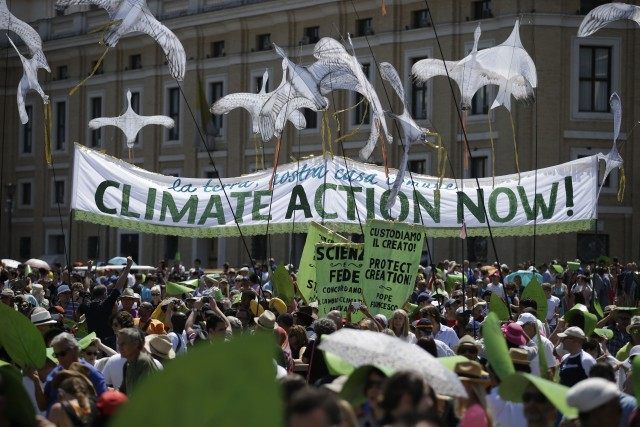With just four months to go until the next major UN climate summit descends on Paris, international delegates are doing what they do best; flying around the world and talking about how they can stop other people doing the same thing.
Foreign and environment ministers and other high-level officials from 45 countries are in Paris today seeking to re-energise climate talks mired in technical details and political squabbling. The Local reports they want to make some headway before COP21, also known as the 2015 Paris Climate Conference, starts in November.
“The negotiations have not, strictly speaking, begun yet,” Laurence Tubiana, France’s chief climate negotiator, cautioned journalists last week. Ministers meeting today and Tuesday ” have to take ownership of the content of the negotiation, otherwise their negotiators will not really be able to engage on the key political issues,” she said.
The current political discussions will be followed in Bonn at the end of August with technical negotiations on the content of a first draft (preliminary) agreement. Then another ministers’ gathering is slated for September back in Paris. Two more pre-meeting meetings are set for Geneva for discussion paper finalisation and draft agreement negotiations before the big one in the French capital.
The 32 foreign and environment ministers and 13 senior negotiators now in Paris, working under the guidance of France’s chief diplomat Laurent Fabius, have their work cut out for them. There are airline flights to be booked and hotel rooms to be confirmed if just the past two climate gatherings are anything to go by.
As Breitbart London reported last December, according to the UN’s own figures, the 19th climate talks in Poland in 2013 drew over 8,300 participants, including 4,022 government officials, 3,695 representatives of UN bodies and agencies, intergovernmental organizations and civil society organizations, and 658 members of the media.
In 2014 around 10,000 delegates flew into Rio de Janeiro for COP 20 and this year the number may be over the 12,000 mark.
All this to tackle a draft agreement that emerged from those early rounds that is little more than an exhaustive laundry list of problems and options. The 195-nation UN Framework Convention on Climate Change (UNFCCC) has embraced a goal of limiting average global warming to two degrees Celsius (3.6 degrees Fahrenheit) over pre-Industrial Revolution levels but is no closer to achieving that goal than it ever has been.
But that clearly doesn’t mean they should stop talking about it nor should they stop flying around the world to do it – even in the face of the UN’s own edicts.
At a meeting in the UK in 2008, Dr. Rajendra Pachauri, a climate scientist with the UN Intergovernmental Panel on Climate Change (IPCC), strongly urged businesses to slash employee travel and to fill the void with video conferencing.
Speaking to members of the British Parliment (via video link, of course) at an event called “Is Your Journey Really Necessary?” Pachauri said that in some regions transport accounts for 40% of total emissions (though in the opaque world of greenhouse gas measurement this number is entirely debatable), and that civil aviation is a major contributor.
Video conferencing, he said, “would be of great benefit in reducing and controlling the growth of emissions from aviation.” For you and me, I guess, but not the august members of the UN itself.
Follow Simon Kent on Twitter: Follow @SunSimonKent or e-mail to: skent@breitbart.com

COMMENTS
Please let us know if you're having issues with commenting.